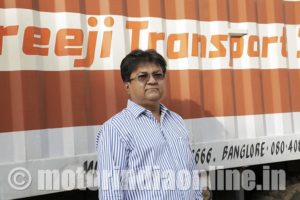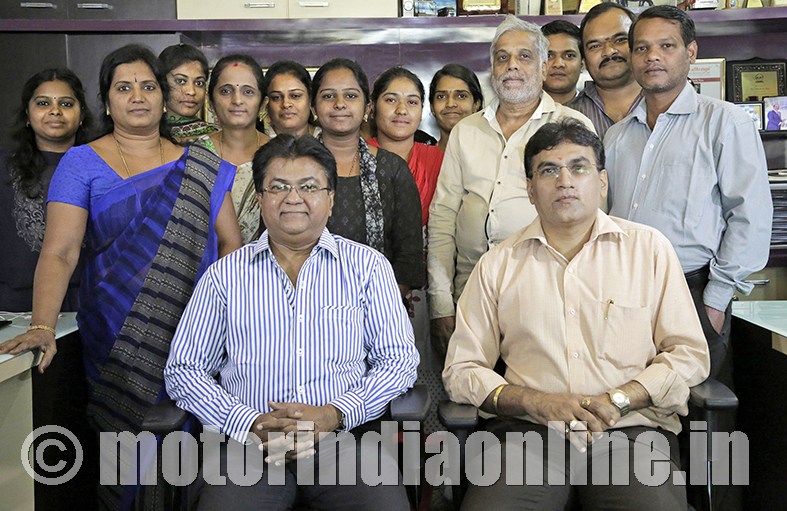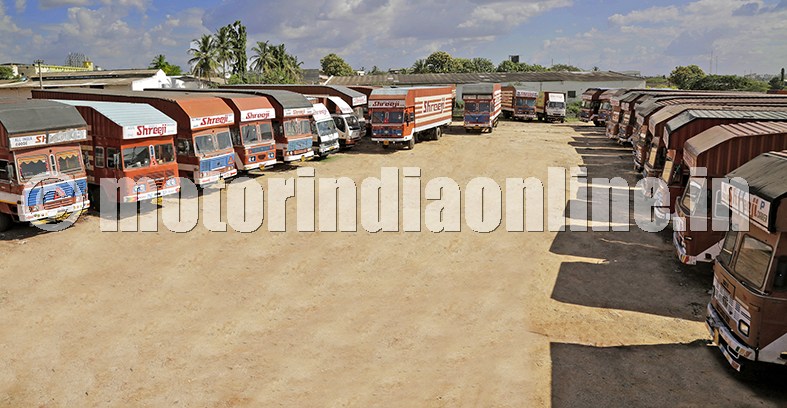Transformation of Rakesh Roadlines, established in 1976, into Shreeji Transport Services in 1984 has stabilised its operations firmly in four logistics domains – full truck load service, import-export container shipping, custom-bonded trucking as a licensed transporter between airport customs and parcel service. A modest beginning as a commission agent, the company expanded to booking operations and parcel service, and today it specializes in containerized road transport.

Mr. Mukesh M. Shah, Director, Shreeji Transport Services, said: “We started with two vehicles. Today we have around 230. We privatized the company in 1994. We are the leaders in custom-bonded trucking. We have been in it for the last 12 years within three years of the Government introducing it. Shreeji has a strong hold in southern, western and northern parts of India.”
The family business, with other family members taking care of operations in Mumbai and Chennai, Mr. Shah and his younger brother, Mr. Rupesh M. Shah, take care of the Bengaluru base.
Mr. Shah disclosed: “When I joined the business I helped my father supply vehicles to transporters. I used to attend evening college because business was not so big then. Today we have 17 offices. We ferry FMCG, garments, agarbathis and pharma products and also cater to the engineering industry. We started containerized vehicles in 1997-98 after which we began transporting electronic items because the clients wanted closed containers for safety.”
According to him, the market has stabilized in the last two years.
He shared: “Last year, the international market demand was less and diesel prices had fallen in India, so the freight also had gone down. But volume wise we have done well even though value wise there was a slight drop. But this year, from April onwards, there is an upward movement. This year we are hoping for 20-25 per cent jump in business.”
Advantage GST
Though the industry is geared to realize the full advantage of GST only in the next few months after its roll-out on July 1, 2017, logistics companies are welcoming the move whole-heartedly.
Mr. Shah further observed: “The logistics industry will benefit tremendously. But people in general and the unorganized sector, which is probably 80 per cent of the market, are afraid that compliance with GST will be an unknown area. It will benefit us because our vehicles go long distance from one end of the country to the other and have to pass through 7-8 States and all of them will have their own rules. If a driver forgets the transit pass in one of the States and if the authorities catch him, it will result in a huge penalty. But the problem is drivers are uneducated, and transporters suffer. With GST, all this should get solved. Border check posts will not be there. Vigilance will, of course, continue. And the advantage is that if once a vehicle is checked, it will not be stopped for a re-check.”
He feels that the players in the huge unorganized sector must be able to survive the GST roll-out and calls it imperative for the economy. “Small truck owners from rural areas are afraid of their survival, and for their survival reverse charging mechanism is better. But for big fleet owners, forward charging mechanism is beneficial. And we need the unorganized sector to survive. Though I have 230 vehicles, they cater to only 40 per cent of the business. For the remaining 60 per cent of the work, I will need them to rent me the carriers. But you will see that the trend will undergo change in the next four years or so.”
Another potential issue that companies like Shreeji are eagerly seeking clarity for is the need to generate multiple e-way bills. He explained: “In case of small parcels, if the e-way bill is above Rs. 50,000 of the value of the goods, it means that the manufacturer will have to generate an e-way bill from his factory to my godown. Then from the sorting hub to the different destinations another e-way bill must be generated. So, generating multiple e-way bills is impractical.” He is hoping that this issue is sorted before the GST roll-out in the coming month.
Changing trends
With many app-based logistics suppliers becoming successful, established companies like Shreeji have no choice but to try and keep ahead: “At the end of the day, these start-ups also need a margin of 2-3 per cent because even if they do not have the ownership cost of the vehicles, they have the administration cost still. So we can go slightly cheaper than them. And a customer feels more assured with us.”
Talking about DFC and opening up of waterways in a big way, he feels competition is going to become tougher: “Over the next 5-10 years, we feel long distance hauling business will go down drastically. Though DFC will definitely pose a threat to road transportation in a bigger way because bulk loads like cement, coal and foodgrains will remain with them like it is today, others like FMCG, pharma and electronics will be routed through road transport only. As a road transporter, I can give at-the-factory-gate service, whereas with railways it will mean that the goods have to reach the rail head. But imagine if the rail service is available only after, say, two days, then the problem of storage crops up. Also, customers are afraid of safety risk in railway transportation because of the long distance routes. With roads being good now, vehicle technology also improving and soon BS-IV vehicles will start plying, things will be better, although for us the cost will go up and mileage will come down with the shift in BS.”
Weak Link – Driver
Mr. Shah claims that Shreeji was the first company to install GPS in all its 43 carriers. Talking about drivers tampering with GPS and the heavy shortage that the industry is facing today, he said: “Earlier the drivers did tamper with the GPS installations, but now we have slowly trained them and they understand that it benefits them too. As for shortage of drivers, it will be there for some time. In the next couple of years though, the industry has a need to hire qualified drivers. A new trend is forming now. Like in the railways, the TC changes every 4-6 hours to rest. Soon, one driver will take a break after driving for 4-8 hours to be taken over by another driver. In this scenario, more people will join this industry. There is huge income in this, but there are no facilities on the road and in the driver cabins too. Now cabin designs are changing, and in developed countries where the drivers are qualified and respected besides being highly paid, it will be the same here too in just next five years. The only thing is you will have to pay 40-50 thousand per month.” If industry experts were to be believed, soon truck driving will be the next big option for white-collared engineers or aspiring graduates.
In all this, Shreeji Transport Services is all set to adapt and continue to be successful.

